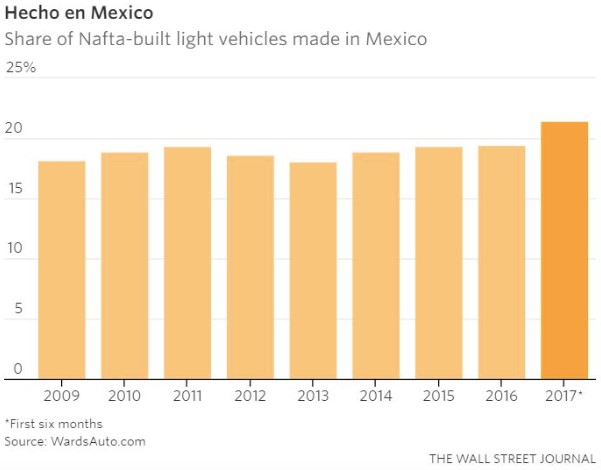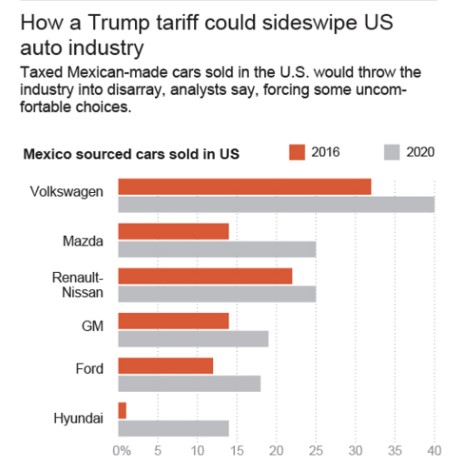The Mexican auto industry is exporting vehicles to the U.S. at a record pace amid ongoing negotiations over changes to the North American Free Trade Agreement (NAFTA) that have Trump trying to drive more production to high-wage areas of the United States.
In the first three months of this year, more than 600,000 vehicles were shipped from Mexico to the United States, representing a 6-percent increase compared to the last quarter of 2017. For the month of March, Mexican auto exports were up 7.5 percent from the same month last year.
But the down side for Mexico is that production for March has fallen 10.9 percent from the same period last year, according to Reuters.
In March, Mexico exported 327,955 autos, up from 304,950 in March 2017. However, total first quarter production was higher than the same period last year, up 6.3 percent.
Mexico’s Economy Minister Ildefonso Guajardo said earlier this week that negotiations are near the end and should be a done deal next month, though there has been no concrete information on a deal structure.
Under the current law, about 62 percent of the parts in any car sold in North America must be produced in the region or automakers have to pay import taxes.
In the latest, U.S. negotiators floated the idea that 40 percent of automotive production must happen in areas paying wages of between $16 to $19 per hour. The rationale behind these wage requirements for the auto industry is to benefit the United States and Canada by leveling the playing field because the current average salary in Mexico is $2 an hour.
If NAFTA members fail to reach a deal soon the trade agreement could end up in bureaucratic purgatory due to U.S. Congressional elections and Mexican presidential elections—both of which would delay any further negotiating.
Vehicles shipped from Mexico made up almost 15 percent of U.S. auto sales in the first quarter this year, with no sign of a production slowdown with the exception of the month of March.
German car makers alone increased production in Mexico by 46 percent last year.
The U.S. is concerned about fair trade in this instance because while Mexican production seems to be on the rise, overall, car sales are on the decline in Mexico, meaning that more and more is bound for U.S. export. Related: Solving The Social Media Data Crisis
For the first time in history, Mexico is expected to hit annual production this year of 4 million vehicles.
Under NAFTA, Mexico's share of North America's vehicle production has risen to 20 percent—up from 3 percent 30 years ago. It’s expected to hit 26 percent by 2020.

(Click to enlarge)
For American drivers, any shift in the NAFTA agreement to level this production playing field may translate into higher sticker prices on cars.
Some of America's most popular cars and trucks are made in Mexico, including the best-selling SUV, Audi Q5. General Motors, Ford, Chevrolet and Fiat Chrysler all build vehicles in Mexico.

(Click to enlarge)
Of the 17.4 million new vehicles sold in the U.S. in 2016, nearly 10 million were made in the U.S. and just under 2 million were made in Mexico, with the next big numbers coming from Japan and Canada.
By Charles Benavidez for Safehaven.com
More Top Reads From Safehaven.com:
















